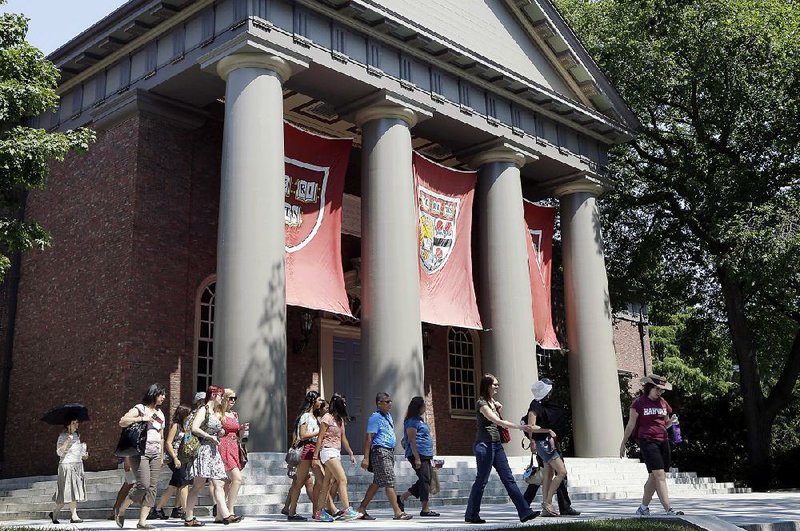NEW YORK -- With many of the largest U.S. college endowments at record values, two congressional committees that determine tax policy jointly opened an inquiry about how the wealthiest schools manage and spend those funds.
The Republican leadership of the Senate Finance Committee and the House Ways and Means Committee sent letters late Monday by email to 56 private schools with assets of more than $1 billion, citing their "numerous tax preferences," and adding weight to the federal scrutiny of college endowments.
Congress is evaluating the value of federal policies that permit tax-free investment earnings for schools and tax deductions for donors. One proposal recommends that schools spend more on tuition relief as the cost of college skyrockets. Some private colleges have prices of more than $65,000 annually.
"Despite these large and growing endowments, many colleges and universities have raised tuition far in excess of inflation," according to the letter, signed by Orrin Hatch, R-Utah, chairman of the Senate Finance Committee; Kevin Brady, R-Texas, chairman of the House Ways and Means Committee; and Peter Roskam, R-Ill., chairman of the House Ways and Means Oversight subcommittee.
Schools that received the letter ranged from Amherst College in Massachusetts to Yeshiva University in New York, and included the eight members of the Ivy League.
"We look forward to providing Congress with data and information they can use to become more familiar with the essential role that college and university endowments play in helping support higher education and in creating opportunities and access for so many students who otherwise might not be able to attend," said Bill Burger, a spokesman for Middlebury College in Vermont, which has a $1.1 billion endowment.
George Washington University is reviewing the letter and will comply with the request, said Candace Smith, a spokesman for the Washington, D.C., school, which has a $1.6 billion fund.
Harvard University, which has the largest U.S. school endowment at $37.6 billion, said it would provide the committees "clarity on the strong financial management practices governing the endowment and the positive impact it has for students, faculty, researchers and society," said David Cameron, a spokesman for the Cambridge, Mass.-based school.
Swarthmore College, with a fund of $1.9 billion, said that while it's been "careful stewards of the resources that were entrusted to us by generous donors over many years, we are certainly willing to demonstrate that commitment in our response to the request," said Greg Brown, the Pennsylvania school's vice president for finance and administration.
Several other schools, including Duke University, Cornell University and Lehigh University, declined to comment on the letter.
The query comes a month after Rep. Tom Reed, R-N.Y., proposed a draft bill that would mandate that endowments of more than $1 billion devote 25 percent of their annual investment income to reduce college costs for low- and middle-income students or lose their tax-exempt status.
Schools supply limited information about their endowments on Internal Revenue Service forms, including the balance, earnings and a breakdown of investment categories. Some colleges voluntarily supply additional details on their websites or in annual reports.
The letter asks 13 sets of questions about the costs to manage the funds, including fee arrangements, and how investment income was spent for the past three years and, if available, for the current year. The questions -- with answers due April 1 -- also seek data about how much of the investment return is spent on financial aid and asks about categories of assets.
Congress needs to have a better understanding of how endowment funds and "the exorbitant cost" of higher education interact, Roskam said in an interview.
"The status quo, in terms of the cost of higher education, isn't working," Roskam said. "If the tax code is having an impact one way or another, we need to understand it."
The letters address donations, including naming rights, at a time when some of the wealthiest schools have received record gifts, which also bolster endowment values in addition to investment income. Schools in the year ended June 2015 raised a record $40.3 billion, according to the Council for Aid to Education.
Schools counter that their endowments come from thousands of gifts, and they can't break agreements with donors who specify how money should be spent.
"I'm hopeful this process will allow us to learn more about how university endowments use their tax preferences to fulfill their charitable purposes," Hatch said in a statement.
Taxes, endowment spending and the rising cost of higher education came before the House subcommittee in an October hearing called by Roskam.
He said holding hearings, asking questions and sending the letters are efforts to learn more about the role of endowments.
"The cost of higher education is just staggering for many American families," Roskam said. "Is there a relationship between the tax code and that cost? That's one of the questions we want to explore."
A Section on 02/10/2016

